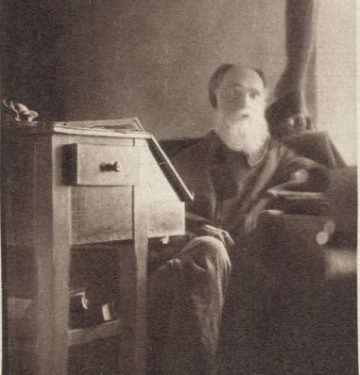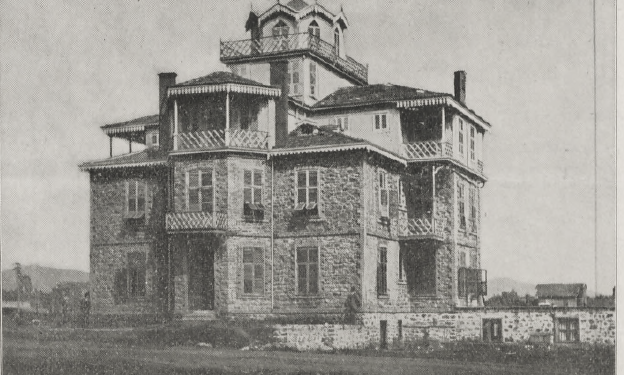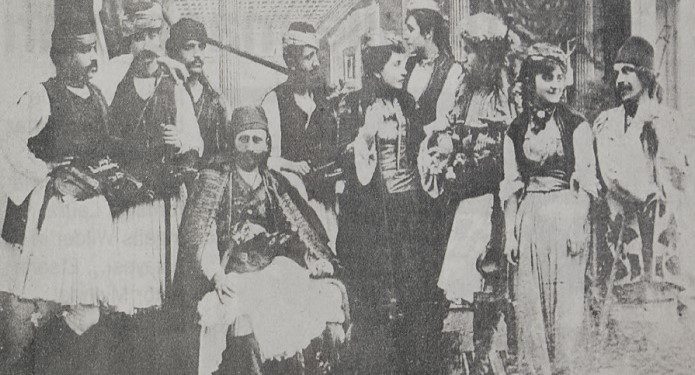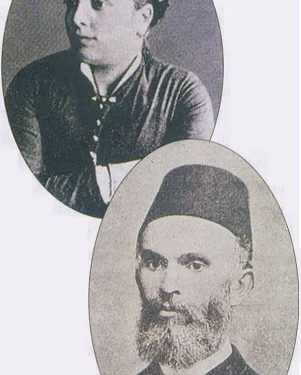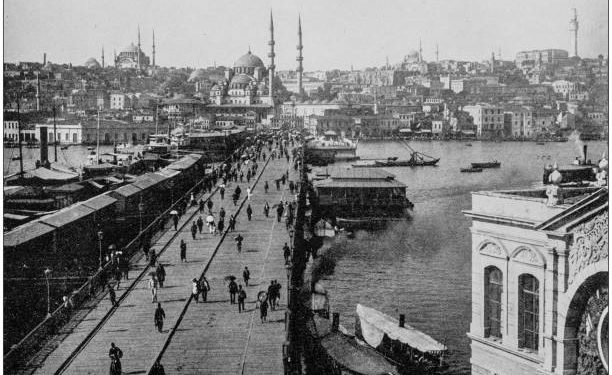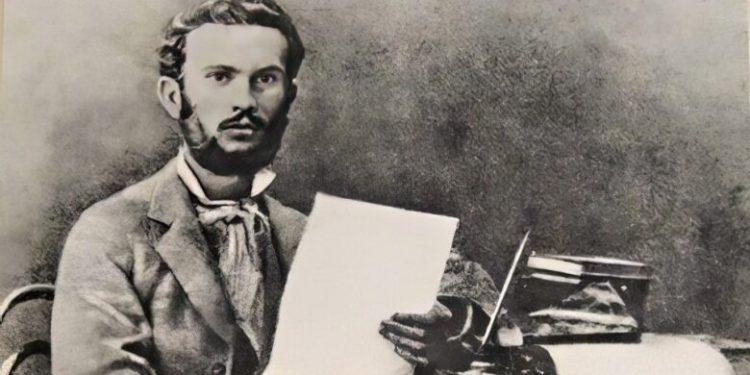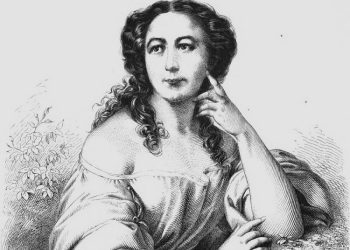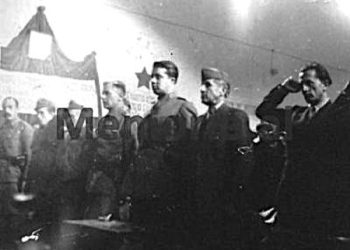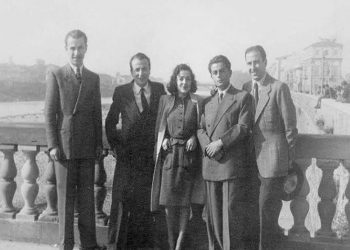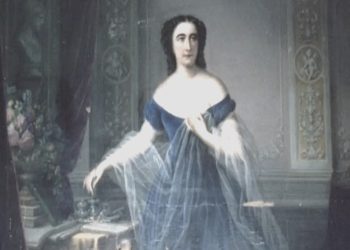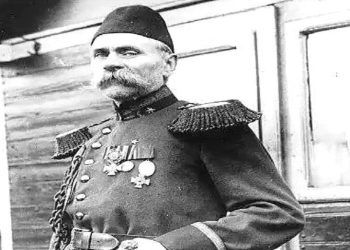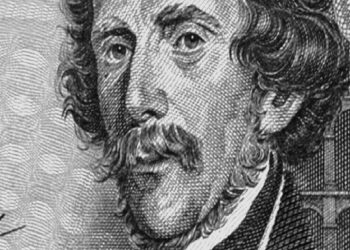By Shasivar Kabashi
– “New Armenia could not forget Shemsed Sami, thus returning to Istanbul in 1882 and surrendering to him, and would expect a child from this relationship, but…”! –
Memorie.al / Shemsedin Samiu or Sami Frasheri, as he is commonly known among Albanians, was the central figure of the National Renaissance, and is considered by many to be the father and ideologist of Albanian nationalism!Living and acting in the center of the Ottoman Empire, with his work and achievements, the Sami dimension exceeds the Albanian one, thus taking on imperial proportions. As a true polyglot that he was, he published and translated many works in different languages, thus leaving indelible traces in the history of the two peoples, the Albanian and the Turkish. About the size of an alim, Samiu would occupy a central place among the Muslim modernists of the 19th century.
Although a multidimensional figure, for the Albanian reader Shemsedin Samiu, he still remains unexplored in his entirety, being known only in the contours of the ideology of nationalism. Through the archives and libraries of Istanbul, a journey through time becomes possible, in the Istanbul of that time, in the footsteps of Sami, in his daily life and inner world…!
Villa in Erenkoj
More than 130 years ago, one morning in Erenkoj… the sun had not yet risen. The whole Jadebostan in a calm still covered with the darkness of the night. Directly in front of the Xadebostan Mosque, a window on the second floor of a beautiful villa shines light. It’s Shemsedin Sami’s villa… it’s Sami’s room…! Sami is writing by candlelight! This was his habit. He woke up very early before sunrise and wrote until he finished, and then slept. Even though gas lamps were used everywhere at that time, he wrote by candlelight, because he couldn’t stand the lamp, he hated it, he couldn’t even stand its smell.
No lamp was seen to have entered his house, but only candles, and that with a chest as it was said then. No one disturbed him in his room, even when he fell asleep, no one woke him up! When he finished writing, he used to clap his hands three times, and this was the sign for his eldest daughter, Samija (Erer), that her father had already finished writing and could come running and hug her. She prepared some kind of tea with cognac and lemon, and they sat together talking. They talked more about literature, even in several languages, but more common were conversations about French literature, thus conversing in French.
Samija had learned French from her father since she was young and had been familiar with French authors since she was young. After they were talking about literature like this, Samija, greeting him with “Allah peace be upon him”, left the room, because the great alim already had to take a nap. The glass of cognac accompanied him even during the break from lunch to dinner, and on cold winter days, he used only tea. But the dinner was very important to Sami. From those who surrounded him, it was remembered that she was the common point of the whole family and the longest time of his stay with them. The dinner lasted somewhere more than two hours, and there he prepared more interesting stories. He often recounted memories from Trablusgarb, the time he was exiled by Sultan Abdulhamit II.
It often happened that in the late hours distant guests would knock on Sami’s villa. He was famous in the East, among Indian and Chinese Muslims. Because he exchanged letters with the intellectuals of these areas, when they came to Istanbul, they didn’t even think about the city’s hotels. They immediately headed to the house of the famous scholar, where they were undoubtedly greeted by his smile. According to the journalist and writer Hikmet Feridun Es, he had various guests from the East and the West, priests, priests, rabbis, writers and painters, where the conversations lasted until the late hours, even often hosting the guests.
The house was so big that everyone felt comfortable. It was designed by Sami himself. Only his study room remained somewhat untouched in that house. If you entered that room on the second floor of the villa, you would find nothing else but books everywhere, which were immediately identified by Sami if someone had moved them from the place. During the day, the table was covered with books, and it was hard to find somewhere between them, that shining head with the long, completely gray beard.
A tragic love
March 6, 1874. “Divan jollu” street that completely describes the line from the former forum of Constantine to the “Topkapi” Palaces, filled with posters warning of the theatrical performance that will be played nearby, in the Ottoman theater on “Gedik” street Ahmet Pasha”, the well-known Vlonjat of the time of Sultan Fatih. A beautiful lined calligraphy of Ottoman letters on the front of the poster: “Besa yahud Ahde Vefa” (Besa or Word of Faith) and a portrait in the middle of the author of the drama, Shemsedin Sami Beut, announce the premiere of the play, which as a book will was published the following year.
The Greek and the Armenian churches, after they had finished ringing their bells and after the abundant ezans of the mosques there, and after the peace had taken over the village, all of them, Armenians, Greeks, Albanians, Turks and others, had taken the road to the theater that was located very close to the hamam of the same name, the pasha from Vlora. After the theater curtains open, an environment with beautiful mountain nature appears. All the actors in Albanian clothing, men’s dresses, almost covered the entire stage. In the main role of Mirusha, dressed in traditional costumes of Albanian women, the beautiful and young Armenian actress, Mari Karayan or Mari Nëvart, as she is known otherwise.
The talented actress was born in the famous neighborhood “Bejollu” in an Armenian family and in the 70s of the 19th century, she was the most popular actress in Istanbul, thus playing the main roles in all of Sami’s plays. ours, such as “Sejdi Yahja” and “Gave”. And according to Professor Metin And, it was not for nothing that she had played in all of Sami’s shows, as there was a love story between them! The famous encyclopedist liked the talented Armenian actress, but the beautiful Armenian, although she felt love for the playwright, at first hesitated to show her love, thus leaving Istanbul for a period, to Tiflis, and playing there the works of Russian classics, Gogol and Griboyedov.
But even though far away, she could not forget Shemsed Sami, thus returning to Istanbul in 1882 and surrendering to his hands. As a result, she would expect a child from this relationship. But even though they were in love, the religious differences in the first place from the Armenian family, would prevent every step of the girl, separating her from the Albanian. She died playing it for the last time on the stage of the theater “Ladies with Camellias”, by Aleksadër Dymas. After this performance, which made everyone cry, she would die on July 8, 1884. According to some accounts, it was said that she died from the drugs she took to abort the child, and some say that she died of boredom and the venereal disease.
Amina
May 4, 1884. In two large Albanian houses in Istanbul, the wedding had begun. One was getting married, the other was escorting the girl to her husband’s house. The Frashërlinjes were tying the krushqi, with the Mirahor family from Korça. The latter had a name in Istanbul, even now some toponyms of the city bear the name Mirahor (Imrahor – Guardian of the Cavalry in the Royal Palace). The first of them, Iljaz bey Mirahori, who was also the son-in-law of Sultan Mehmet II and also loyal to his son, Sultan Bayazit II, had established a career and a family with dynastic roots. He even turned a part of the Orthodox Monastery of St. John in Constantinople into a mosque, naming it the Mirahor Mosque.
Emine was from this seed. From a family of soldiers, now she was creating her own family, with the most skilled pen among Albanians. The couple would live in the large villa in Erenkoj. They would live their happiest days there, and there their four children, Samija, Sadija, Sadiu and Ali Samiu, would be born. From the first days of marriage, Shemsedin Samiu wanted his wife to be a model for the time, taking care of her image and appearance. Both of them had a great love for each other and even had a character and nature similar to each other. Although they came from noble and wealthy families, they were very modest, very peaceful, highly educated and both were characterized by gentleness.
Emineja, even though she had expensive clothes, she was able to give it on the spot to someone whose eyes remained on her clothes. The luxury of clothes did not carry weight in her life, she was an athlete, one of the rare for the time, as the researcher Turgut Etingu also shows. She walked freely and did the jobs that at the time were called men’s. He drove his own cart and often went to the well-known Kaješdak mountain to get the cleanest water. And as the son of a sportswoman, Ali Samiu would write his name in the history of sports in modern Turkey, founding the famous club of ‘Galatasaray’.
Whereas Sami a few years earlier, while he was writing the exclusive book about the woman entitled; “Women”, and was describing how Muslim women should be in the modern period, creates the impression that he is talking about his future wife – Eminë. She would leave a mark and a very good memory in history, a joint photo with Sami. For the time we are talking about, it was rare for a woman to appear in the photo, because it was a discussed issue, which had brought clashes between modernists and conservatives, who saw the photography itself as unacceptable, let alone to photograph a woman.
That day, Sami and Emineja took the ferry from Kadëkoj to Karakoj, exclusively for a joint photo. But Emineja didn’t have much life and she would live with Sami for only 9 years together. Although very short, she would leave unforgettable memories and traces in Sami’s life, who would always remember her, until he died. After Emine’s death, Sami would marry one of his cousins, but he would never love her as much as Emine.
He had even, until his death, kept a secret: in his study room, which was rarely entered by anyone – he kept hidden in a corner a box containing a handful of Emine’s hair, with a portrait of sled in the middle and on the sides with Persian poems, which were written by Sami’s own hand. This box, no one had noticed, as long as he was alive and only after his death, it was discovered by his eldest daughter, Samije Erer, who continued to keep it as a beautiful memory, from her parents.
On the Gallata Bridge
He was not in the habit of leaving the house often. Those who lived with him mention that he did not prefer to walk much, and within a month, he happened to go out into the city only two or three times. Perhaps also because to get down to the central part of the city, he had to take the steamer and it was a movement that took time. He even met his many friends on the steamers. He was easily distinguished: 1.84 m. was his height and he wore a beard, since the age of 20. As he boarded the steamer, everyone arranged to greet him one by one.
Therefore, when he went out for a job, he wanted to finish it quickly and return home. But some random nights it was different. As his eldest daughter, Samija, remembers, one rainy night, while they were crossing the famous Gallata bridge, to take the ferry to Karakoj, Sami would stop with his daughter, to listen one by one to all the beggars, as the beggars were called, who sang in different languages on the bridge, coming from different provinces of the Empire. Having mastered several languages, it was easy for him to understand almost everyone in their own language as they sang.
That night he was enchanted by someone who sang and recited poetry in Arabic. Although it was a rainy night, he was sitting next to him, staying like that for an hour in the middle of the bridge. This was his nature, simple and very modest! With such people, he often sat and talked about poems, folk songs and their problems, it even happened that after long conversations, he invited them to his villa, talking all night, as it once happened with a Tunisian .
Lamartine and the last words
The month of June 1904 would find Sami in a bad state of health! He seemed to feel himself leaving this world and began to talk more often about his deceased brothers. He remembered them more often and said: “All my brothers died on Saturdays, I will also die on Saturday.” Although his physical condition was not good, he continued with his daily schedule, trying to still work in his beloved room, but by the middle of June, he finally surrendered to his bed. Even in bed, he did not forget the old habit with his beloved Samia – chatting about literature.
The day before he died, he had called Samija to read him something from French writers: “Read to me from Lamartine, read to me from Graziella”. Usually Victor Hugo and Lamartini were among their favorites. After Samia finished reading a piece, the two would then discuss it at length. That was the day before June 18, 1904, and the next day, Saturday – as he himself had felt, around 9 o’clock in the evening, whispering the last word “Allah”, he closed his eyes. Thus he would physically leave this world, remaining alive forever, in the memory of two great peoples. Memorie.al
*This article was published in the newspaper “Koha Ditore” on October 29, 2016




